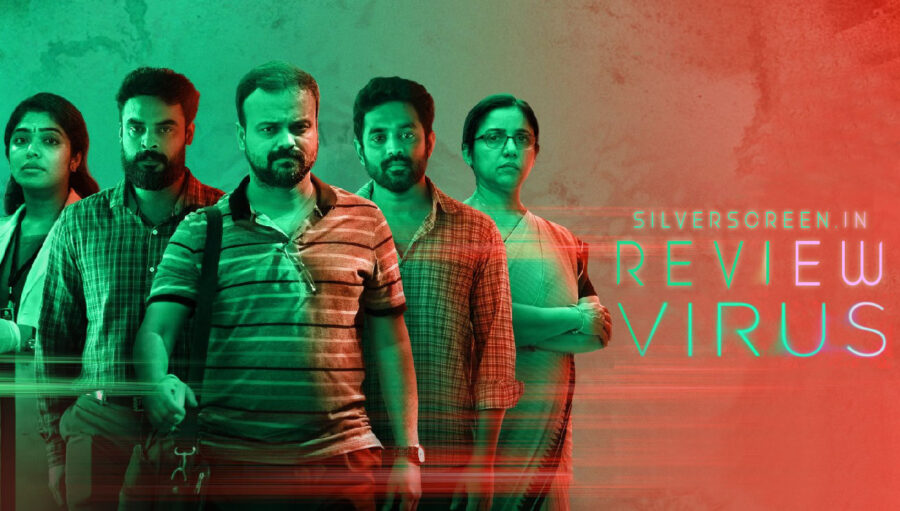Director: Aashiq Abu
Music Composer: Sushin Shyam
Cinematographer: Rajeev Ravi
Cast: Kunchakko Boban, Parvathy, Asif Ali, Revathi, Tovino Thomas, Indrajith, Rima Kallingal
Virus, directed by Aashiq Abu, must have been a gruelling filmmaking experience. The film, a thriller based on the real incident of Nipah virus outbreak in Kerala’s Kozhikode district in 2018 that claimed 17 lives, is spread out on a vast canvas. It moves through multiple personal stories that happened over a short period of time, using these stories to flesh out the clerical, official data and infuse drama and emotions into the medical and bureaucratic processes. A great number of actors appear in front of the camera. Aashiq puts to use his resources like an exceptional manager, with a firm command over the process.
The film strikes the right notes within a commercial cinema framework, almost never slipping into blunt sensationalism or turning the story of human survival into a sore emotional hyperbole. Although there are also instances where you feel they were tempted to play to the gallery. When the news of a virus outbreak starts to spread, Doctor Annu’s (Parvathy TK) husband, also a doctor, wants her to take the day off from work at the medical college and stay away from danger. She resists. When she gets a phone call from the hospital informing that they are in need of data collectors, she gleams and in the following days, goes on to do incredible things that save a government machinery from failing. What makes heroes, you might want to ask. A constant hunger to do great things? Or are they just ordinary people whose show of courage is accidental?
May be a good mix of both the worlds. An underpaid sanitation worker (Joju George), whose name we rarely hear, decides to stick around even after all his colleagues have fled the hospital premise, because the government promises him a better job and payment. He lives in another kind of tragedy most of his higher officials don’t understand, one of destitution. Virus pays attention to the responses of a motley bunch of characters, cutting across different classes and circumstances, to the virus outbreak.
In the initial half, you see from close quarters the insides of a casualty ward in a government medical hospital. It’s a marvellously cut sequence (editor Saiju Sreedharan). Coughing, bleeding patients and clamouring, wailing bystanders. Young doctors working hard to keep things in control. Human lives gone, human lives saved, all in seconds’ time. The chaos and the crowd, when seen in real life, might have seemed normal. But here, since we know somewhere in that frame there is a carrier of the virus, we wait with bated breath. You sense the humongousness of the tragedy in store.
Aashiq and his writers, Muhsin Parari, Sharfu and Suhas, structure the film in such a way that there is no individual winner at the end, but a society that fought a contagion together in an unprecedented fashion. Fear is omnipresent, but not condescended. It is understood, accepted and used as a motivational agent. Particularly interesting is the scene where Dr Baburaj (Indrajith), a bootstrapper of few words who looks at the disaster with an amusing detachment, takes over the task of handling dead-bodies, and calls for volunteers from a small team of workers. He acts swiftly, with the precision of a machine, without giving anyone the tiniest space to make sense of their nervousness and back out.
The highlight of Virus is the governmental mission to trace the source of the outbreak. They have a deadline in a week, since members of a central government department are hanging around, subtly exerting pressure on the medical team and the health ministry to look for a political angle to the situation. It is in this part, where the worst of Nipah is over, the film’s lard begins to show. Tension weakens. A lot of details are crammed into the narrative – vignettes of social boycott that the victims’ families face, the amateur sleuth job that Annu and other carry out to trace the origin of the virus, and at one point, a chief medical officer falls sick – patchily, without a great order. The audience are left to fill the gaps between the scenes. The relationships between prime characters become the least dynamic. The film’s handling of the medical team from Delhi is erratic; it reflects the film’s prejudices about outsiders with a different opinion on the situation. And moreover, you don’t really feel the paranoia that isolation wards and social boycotts induce. The film rushes through everything, without holding a moment or an emotion.
In the first half, there is an overdose of Sushin Shyam’s background score eager to assist the audience in identifying tension. “It might be Nipah virus,” says Dr Suresh Rajan (Kunchakko Boban) at a high-level meeting, and the music starts to shriek from the background. This is how music operates throughout the film, overpowering the rest of the elements. Cinematographer Rajeev Ravi experiments with colours (green and red are used in prominence) and lighting, but his images, surprisingly, aren’t impressive enough to linger on.
The film doesn’t advertise optimism. The sign of relief on the health minister’s (Revathy) face when she realises that the situation is under control is not self-congratulatory. The film doesn’t hold a loud victory card at the end. The characters gently move on to a normal life they had been missing so much – Look at that shot where Joju goes to buy a school bag for his son. This humility, perhaps, comes from an understanding that human beings as a lesser species that can be thrown into a state of absolute abnormalcy by an organism invisible to normal eye.
Recommended
From Sudhish, who plays a local health inspector, to actor Soubin Shahir, as a dying Nipah patient pleading with the medical officers to not remind him of his tragic personal life, the film’s ensemble cast delivers a terrific performance. The film doesn’t acknowledge their star status (you hardly recognise Parvathy when she walks into the frame), but they add weight to the characters they play. Filmmaker Sakhariya plays the index patient, in whose body the virus began human invasion in this part of the world. Sakhariya plays the character with a childlike rawness which makes it easier for us to identify with the tragedy that befell him and his family. In an epilogue scene, the film imagines how he contracted the virus, and it is, curiously, the most poignant scene in the film. What triggered this deadly disaster, the film says, wasn’t hate, but an innocuous act of love for everything in this world.
*****
The Virus review is a Silverscreen original article. It was not paid for or commissioned by anyone associated with the film. Silverscreen.in and its writers do not have any commercial relationship with movies that are reviewed on the site.



